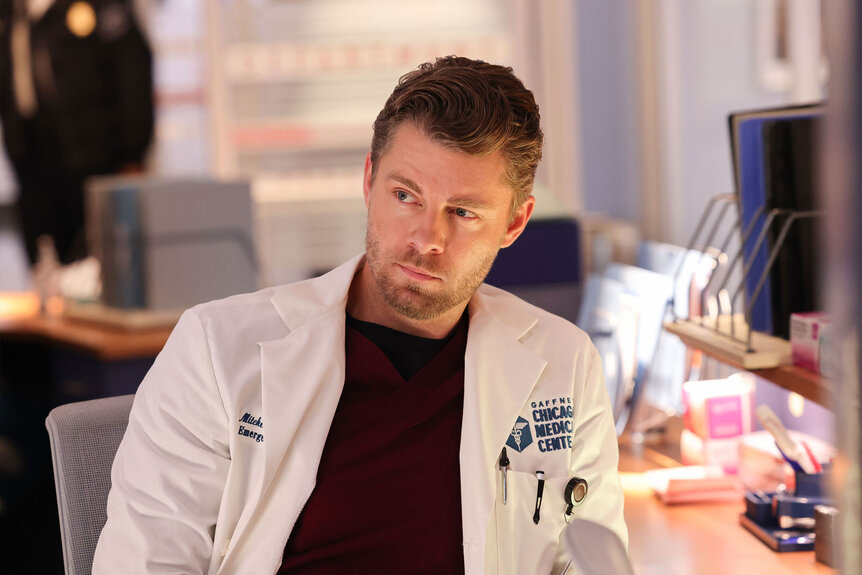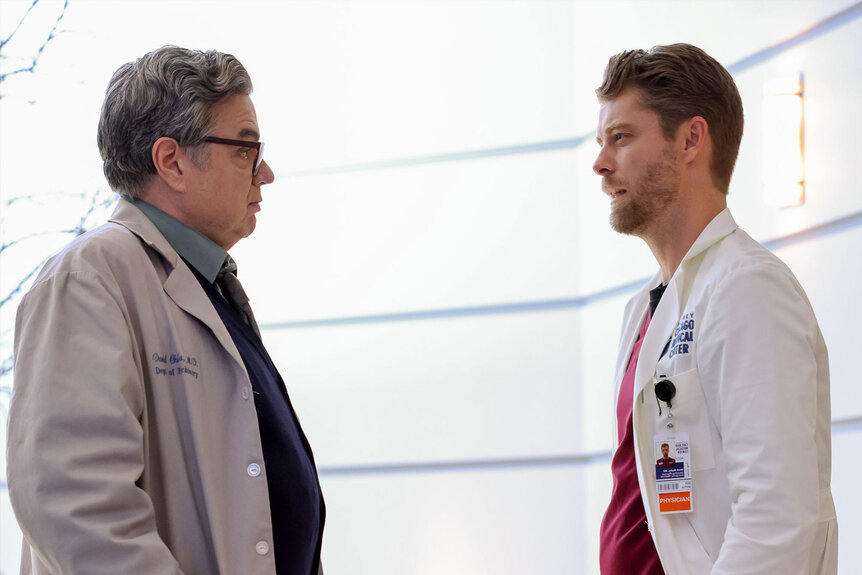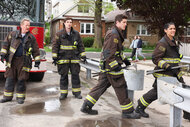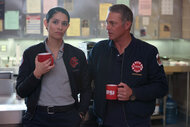Dr. Ripley’s Troubled Past Is Revealed on Chicago Med — And He Hasn’t Forgiven Dr. Charles
When head of psychiatry, Dr. Charles, asks Gaffney's newest doctor how they know each other, Dr. Ripley responds, "It was 20 years ago. I looked a little different."
Dr. Mitch Ripley made his big debut in Gaffney Chicago Medical Center's emergency department, and it came with plenty of drama.
Ripley, portrayed by Blindspot actor Luke Mitchell, is the newest attending doctor on Chicago Med, and his appearance on the Season 9 premiere revealed a troubled history with another doctor, and also led to an incident involving a patient.
RELATED: Chicago Med's Newest Doctor May Find Love with Another Hospital Employee, Producers Say
Chicago Med executive producer Andy Schneider previously told NBC Insider that Ripley "has an old and difficult relationship with Dr. Daniel Charles [Oliver Platt]" and that "he carries some resentment to Charles for that past" — but viewers now know a little bit more about what that past relationship entailed.
In Season 9, Episode 1, Dr. Charles recognizes Dr. Ripley right away when he spots him in the emergency department, but he's not quite sure yet from where.
"Who’s that new guy?," Charles asks Dr. Dean Archer early on in the episode. Archer responds, “Oh, that’s our new ED attending. Name’s Ripley.”
Dr. Mitch Ripley is "real smart" with "great references"
Dr. Charles says that he knows Ripley from somewhere and asks what his deal is. "He’s real smart. Got a full ride to Columbia," Archer explains. "He’s got great references.”
Later on, when doctors Charles and Ripley make eye contact for the first time, Charles flashes a smile, but Ripley looks alarmed and doesn’t smile back.
As victims of a multi-vehicle interstate crash begin to arrive at the hospital, Ripley and charge nurse Maggie Lockwood (Marlyne Barrett) head into one of the emergency department rooms to treat a guy named Harris, who's there with his wife Audrey.
The couple explains that Harris tried to avoid the pileup, but he got dizzy. “That’s been happening a lot,” Audrey says of her husband's dizzy spell. This prompts Dr. Ripley to ask Harris if he's short of breath, which he is. His blood pressure is also high, and he happens to be bipolar and on meds for that mental health condition.
"He’s been managing very well," Audrey said of her husband's disorder. Ripley explained that he's still concerned about Harris' breathing, blood pressure and dizziness. "I’d like to do more of a workup," the doctor says, as Audrey admits she's been worried about Harris.
Privately, Maggie asks Ripley if someone from psychiatry should have a look at Harris, since he's on mood stabilizers. "Dr. Charles is on call," she points out. But Ripley responds, "I don’t want to bother him just yet. Let’s just see what the labs show.”
Dr. Ripley’s relationship with Dr. Charles goes back 20 years
Doctors Ripley and Charles have an awkward encounter when they cross paths, and the head of psychiatry extends his hand to shake, introducing himself and saying, "We’ve met before, haven’t we, we know each other?”
Ripley responds, “Good memory. It was 20 years ago. I looked a little different.”
Later on in the day, Charles sifts through a box labeled “medical files,” pulls out a confidential medical record on "Mitchell Ripley," and flips through a “psychiatric report” with a photo of a boy paper-clipped to it.
Ripley, meanwhile, is occupied treating Harris, the bipolar patient involved in the crash. “Your bloodwork shows elevated glucose, LDL and inflammatory markers," Ripley tells his patient, adding, "These are all metabolic symptoms, which can be associated with the mood stabilizers you’re on.”
RELATED: Chicago Med's Newest Doctor May Find Love with Another Hospital Employee, Producers Say
The doctor tells Audrey that he thinks her husband is over-medicated. "Too many mediations at unnecessarily
high doses, they’re putting him at risk," he explains.
Ripley informs Harris he wants to try taking him off one of his bipolar meds to "see if the metabolic symptoms improve," adding it would be done while he's in the hospital under observation, and that if there's a problem, staff can put him right back on the medication. Harris agrees to it.
Dr. Ripley's treatment plan for one patient causes a bad reaction
Fast-forward a few scenes though, and it seems like Ripley's plan didn't go so well. Harris is seen yelling, "Time for me to go. I don’t want to be here anymore," and "let me out of here... they’re gonna kill me," as he flails around while trying to get out of his hospital bed while staff holds him back. He then rips tubes out of his arms, causing blood splatter.
Maggie gives him a shot to calm him down. Dr. Charles asks Ripley for a look at Harris' chart, then requests a word with the doctor.
Charles asks Ripley why he took Harris off a drug. “He’s a bomb about to go off," Ripley explains, adding, "Did you look at his chart?” After rattling off a list of things wrong with Harris, Ripley tells Charles that he needed to find out if they were caused by the meds he was on.
RELATED: Producers Warn Life is "Not Going Well" for This Chicago Med Fan Fave in Season 9
But Charles asks why the psych department wasn't consulted, saying, "I’ve been here all day."
“He’s not your patient.” Ripley shoots back, with Charles responding, "He looked an awful lot like a psych patient to me.”
Ripley retorts, “Not today. Today he’s an ED patient with metabolic syndrome.” Charles says that Harris "flipped out because you took him off his meds.”
The pair continue to argue, with Ripley saying he believed Harris was overmedicated and was trying to prevent him from have a stroke. He adds that some of the drugs Harris was on were redundant, but Charles says that "the two mood stabilizers are actually complimentary."
“Yeah, yeah, you guys love to medicate," Ripley says.
It soon becomes clear that this is personal when Charles calls what Ripley did "reckless" and Ripley responds, "Why don’t you just say it — impulse control disorder, isn’t that what you called it back then?”
When Charles asks Ripley if he took Harris off his meds because of him, Gaffney's new doctor says, "I’m an attending physician at this hospital. Do not treat me like the boy you knew 20 years ago.”
After the explosive encounter, Dr. Charles, seemingly looking to patch things up, finds Ripley on a roof deck at the hospital.
"What I really came up here to tell you is how impressed I am with how you turned your life around," Charles tells Ripley. "Truly, you’ve done so well.”
When Ripley asks his apparent former doctor if he turned out better than he expected, Charles says that the boy he knew had a lot to overcome.
“Yeah? Top of the list, maybe county juvenile?,” Ripley asks, naming several drugs and asking Charles if he remembers his psych care.
Why do doctors Charles and Ripley have bad blood on Chicago Med?
“I do remember," Dr. Charles tells Dr. Ripley of the latter's psych care in a juvenile detention center two decades earlier. "I remember that you were violent, and you were aggressive. It was a big place, a lot of kids. You know we had to protect them.”
Ripley mentions "chemical restraints," which are drugs that can restrict a patient's movement and cognitive functioning. "It worked," Charles retorts, to which Ripley says: “I couldn’t move. I couldn’t sleep. I couldn’t pee either. It was fun times.”
Dr. Charles tries to reason, "Look, we know a whole lot more about those meds now than we did then," but concedes, "Frankly, you probably were overmedicated, you were.”
Dr. Ripley suggests Dr. Charles "booked" from the juvenile detention center he worked out
During the intense faceoff, Ripley implies that there's still more to the story. "And then you booked," he tells Dr. Charles, who seems confused, responding with, “I booked?”
Not offering many more details, Ripley says, “You took off. You left.”
Charles, lost for words, says without finishing his thought: “Well, I mean, I imagine that’s because... my rotation was probably..."
Ripley just grins and tilts his head, responding “ok” and heading back inside.
Charles looks as if he’s trying to remember something, but the episode ends before viewers find out what that is. To find out more about Ripley and Charles' complicated relationship, check out Season 9 of Chicago Med Wednesdays at 8/7c on NBC, or stream episodes the next day on Peacock.







































